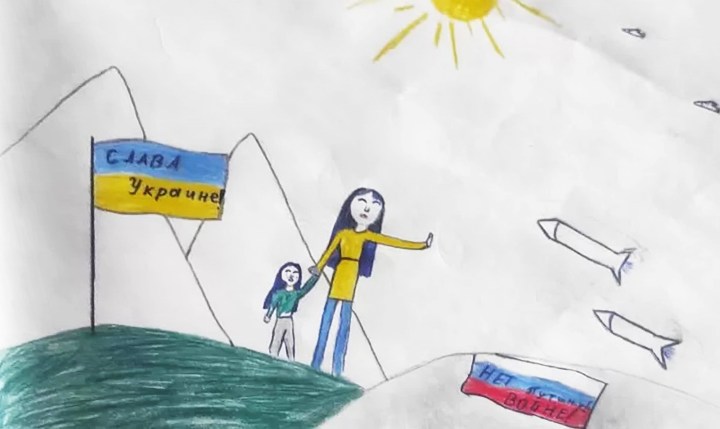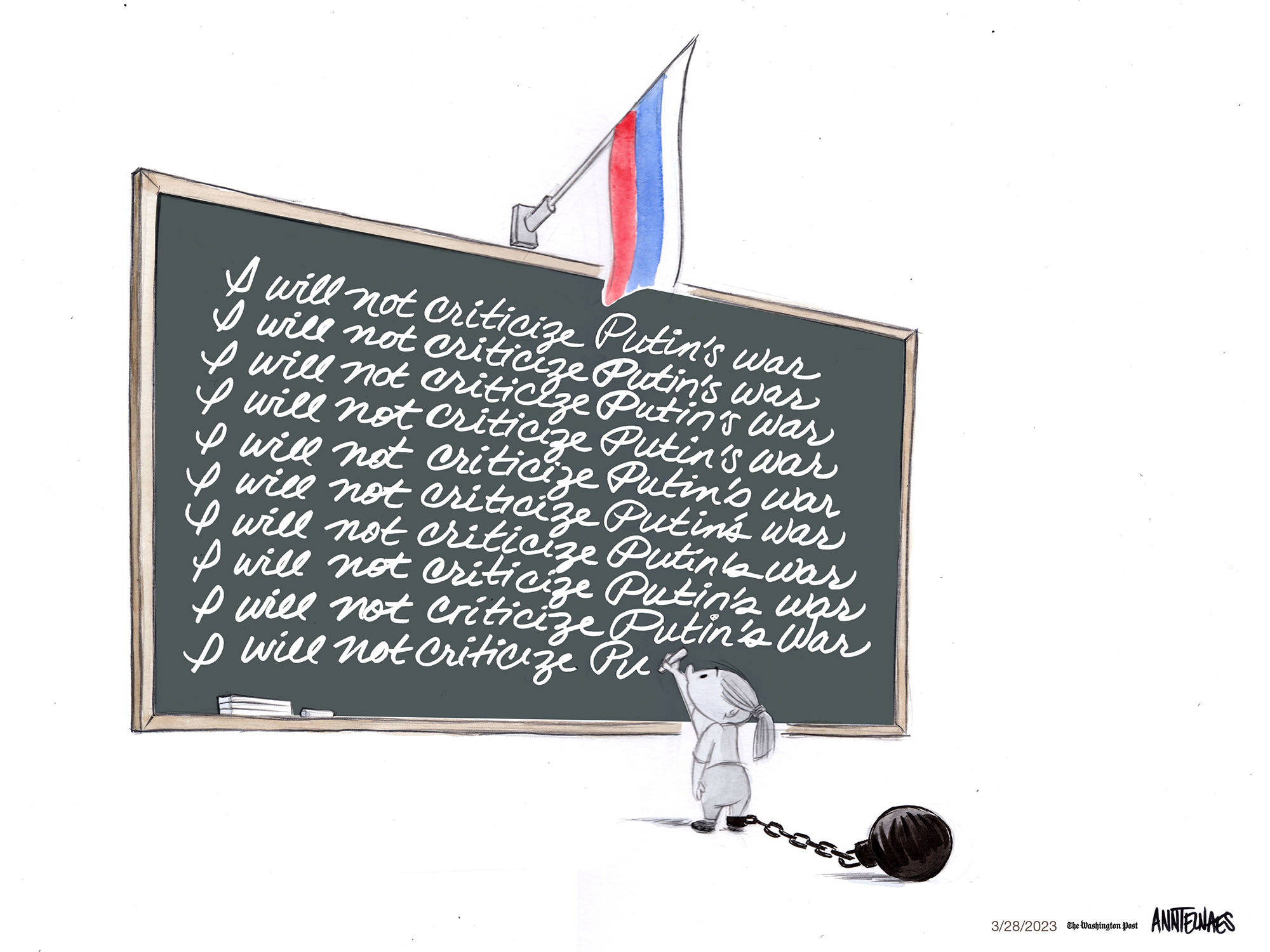TYRANTS AND TOONS OP-ED
The Cartoonist and the Tyrant — the Masha Moskalev story

A year ago, a 12-year-old Russian schoolgirl drew a cartoon which would bring the wrath of the regime down upon her and her family. It’s also a story about the power of a political cartoon.
The Cartoonist carefully colours the dark green hill of Ukraine as she imagines it to be standing to the west, beside the snow-white hill on the eastern Russian side.
She diligently places each nation’s flag on its respective hilltop to set the scene: to the left, a blue and yellow flag upon which she writes the words ‘Glory to Ukraine!’ flying proudly from its post, taught with the wind at its back, as if this were a sign of its own resilience.
In contrast, on the white hill to the right, the Russian tricolour lies flat and crumpled — dishevelled, shameful — with the words ‘No to War!’ inscribed on its disgraced white, blue and red bands.
The Cartoonist draws a deep breath and surveys the landscape that she has created: It is as she had imagined; the perfect setting for what she is about to draw next.
Meanwhile, from the Kremlin, 320kms away, the Tyrant orders a clampdown on the last of the dissenters and anti-war protesters. Over the past two months, tens of thousands had been apprehended, beaten and arrested, and thousands of them incarcerated, his iron fist slowly grinding their campaign to a halt.
Carefully, using her pencil, the Cartoonist outlines two women — a mother and daughter, someone perhaps the same age as herself. They are shown standing firm on the Ukrainian hilltop alongside the flag, their feet just behind its horizon to provide depth and perspective.
Like the flag, they stand proud and resilient. The mother wears a yellow top and blue jeans, matching the colours of the standard. The child is dressed in the green and grey colours of the landscape. Their expressions are resolute and they are holding hands in solidarity. This could be any mother and child, muses the Cartoonist, who had not lived with her own mother since she was three.
Possibly emboldened by that thought, she draws the mother’s left arm extended defiantly towards an advancing threat, her palm open as if to call it to a halt. The threat is depicted in the form of two missiles, rocketing towards them from the Russian side; a violent intrusion breaking the tranquillity of this otherwise peaceful, whimsical image.
The Cartoonist surveys her work, and she is pleased.
In the distance, she draws the Carpathian mountains rising to their two highest peaks, Hoverla and Brebeneskul, in a bold pencilled outline. Over the millennia these mountains have witnessed the ancient, rich, often troubled history of the two great nations unfold. A history which at times saw them as one.
Masha had learned at Number Nine School the importance of history, and how lessons from the past can help us in the future. She was taught with patriotic fervour of all the times her great nation had been invaded… by Batu Khan’s Mongols in the 13th century, France under Napoleon in the 19th century, and just over eighty years ago Hitler’s Germany tried its luck. Now, it was Russia who was the invader. How, in the 21st century, could this invasion be acceptable? Masha, and her father, knew it was not.
Read more in Daily Maverick: Ukraine Crisis Archives
The Tyrant’s televised speech and the subsequent bombardment of revisionist history and propaganda on tv and in the classroom did not convince Masha that this invasion was any more righteous than those that had visited her own country. She was surprised at how her friends, their parents and even her teachers had adopted the party line — that this wasn’t an invasion or an act of war… and even if it were, it was justified!
To uphold this conviction they initiated this project to draw pictures celebrating the great Russian army and its Special Military Operation. Masha thought that she would use the opportunity to show how it might feel from the other side. Maybe her drawing could change hearts and minds?
Masha might not have realised it, but that critical thinking is what qualifies her drawing to be regarded as an editorial cartoon. It’s not just agitprop as commissioned by her teacher, it’s a socio-political thought piece in graphic form, employing critical thinking and, like any good editorial cartoon, it fearlessly speaks truth to power, following a tradition of “punching up” to the mighty in defence of the oppressed.
The Cartoonist changed her pencil for a yellow one to depict the springtime sun shining down, just as it did outside the windows of her classroom that spring day: one year ago this month, and one month after her 12th birthday, and just two months after Russia launched a full-scale invasion of its neighbour. On that late April day, everything was to change for Masha and her family.
The Tyrant, having declared victory in the city of Mariupol, ordered that his high-precision missiles be directed at multiple new targets in Ukraine, raining terror on its citizens.
Read more in Daily Maverick: Defiant Putin visits Mariupol after ICC warrant issued
Twelve-year-old Masha Moskalev handed in her work. She probably expected that it would cause a stir amongst her fifth-grade classmates, who were engaged in drawing their own images which dutifully followed the patriotic line. But she was totally unprepared for the trouble that her work would unleash… a sudden turn of events that would sweep her up in the very same conflict that her drawing had depicted; almost as if it were a self-fulfilling prophecy.
Nina Vorobieva, Masha’s art teacher took one look at her work and — shocked by its seditious content — hurried it to the school’s principal Larisa Trofimova who, in turn, reported it to the police. Terrified Masha fled from her school to her home, where she told her father, single parent Alexei Moskalev, what had happened.
He reassured her that it couldn’t be that serious, and promised to go with her to school the next day where he would reason the matter with the teachers. But when he got there, the police were summoned. They arrived with social workers and the Moskalevs were admonished in front of the other students.
Meanwhile, witness statements were taken from the teachers. The two felt as if they were being treated as terrorists, Alexei would later recall. They were apprehended, put in a police car, and escorted to the head of police for the Efremov district.
The police interrogated Masha’s father and determined he was an irresponsible parent for filling her mind with subversive ideas regarding Russia’s special military operation into Ukraine. They looked at his social media posts and found comments and cartoons (including this one) criticising Putin and his war. Alexei was charged and after a subsequent court hearing fined RUB 32,000 ($415 at the time) for “discrediting the Russian army” on the Odnoklassniki social network.
While Masha was afraid to return to school, her father assured her that it was surely all over now, and that things would soon get back to normal. He was wrong. At school, Masha was detained by the FSB (formerly KGB) and her father was summoned for another interrogation. To avoid further trouble, the agents invited Masha to “join a youth group in support of the Russian army”. But father and daughter declined the offer, and their harassment persisted over the following months.
The Tyrant was growing impatient. Eight months into a campaign he thought would take a few days, he announced “a partial mobilisation of Russia’s military reserves”, a military service call up which reignited protests against the war in his own country. Again, the uprising was suppressed by force, with the firing of live ammunition.
Meanwhile, media coverage of Russia’s response to Masha’s cartoon had caused further distress to the regime and its leader.
On December 30th 2022, masked men invaded the Moskalev’s home, violently upturning furniture and emptying their closets, searching for evidence of their complicity with the enemy. They seized their cell phones and about $5,000 in cash, and again apprehended father and daughter.
Masha was taken to one of Russia’s “social institutions” for minors. Alexei was interrogated and asked where he got the money from and who he worked for, and he was beaten and tortured to the point that they were afraid he might die, and so they called an ambulance.
After their release, the two fled to another town for their safety.
However, a case of further “discrediting” the Russian army was laid against Alexei and last month they were visited again by men in balaclavas (one of whom was in a police uniform), and he was arrested without a warrant, and sentenced to house arrest. Masha was taken to a social rehabilitation shelter for minors, and has not seen her father since.
Anticipating his imminent incarceration, Alexei fled Russia but was arrested in Minsk, Belarus, apparently after switching on his mobile phone. He had been given a two-year jail sentence in abstentia, and is currently serving that time in a Russian prison.
A few weeks ago, Russia’s ‘Commissioner for Children’s Rights in the Office of the President of the Russian Federation’, Maria Lvova-Belova (who, with Putin, has recently been charged by the International Criminal Court for the war crime of wholesale abduction and deportation of Ukrainian children), announced that Masha would be released so that she could stay with her mother, Olga Sitchikhina from whom she had been estranged for over 10 years.
That someone so high up in the Tyrant’s office had taken such a personal interest in this case — amongst so many thousands of Russians accused of dissent — is evidence enough that the Tyrant himself had taken an interest in a 12-year-old girl’s etchings, and (on the same assumptions made by the ICC) is complicit in her abuse, harassment and maltreatment, and her father’s arrest, torture and imprisonment — all because of a cartoon.
As harrowing as this is, this speaks to the power of a well-crafted editorial cartoon, and shows how it very often reaches its target. It speaks of the need for us to urgently protect the rights of editorial cartoonists worldwide, and ensure that they are free to express themselves through their work, particularly when they find themselves up against the world’s most powerful people.
On the first anniversary since the Cartoonist put pencil to paper to create that potent political cartoon, perhaps the Tyrant should pause to consider how his actions, and those of his subordinates, have served to broadcast what otherwise may have unfairly been disregarded as a child’s naïve scribble. Instead, as its global coverage more than a year later will attest, they have given it all the attention it deserves. DM/MC

Anti-war cartoon depicting 12-year old Masha Moskalev, 28 March 2023. (Illustration: Ann Telnaes)
John Curtis is a veteran South African cartoonist and one of the founders of Maverick Citizen’s cartoonist collective, Ubuntoons. This article was first published by Cartoonists Rights, a non-profit organisation established to defend cartoonists against threats of criminalisation, intimidation, incarceration and worse. Executive Director, Terry Anderson, says that in spite of its simplistic style – or perhaps enhanced by it, this cartoon, fearlessly created by a 12-year-old Russian girl under a tyrannical regime will be appreciated by free thinkers worldwide as the brave, powerful and important work that it is. He has called on all champions of free expression to denounce the suppression and abuse of cartoonists worldwide, and Putin’s treatment of Masha and Alexei in particular.





















 Become an Insider
Become an Insider
A fabulous insight into the power of cartoons. John Curtis gently lifts this incident by the scruff of its cartoon and places it at the core of this absurd and barbaric conflict.
An amazing story highlighting once again that the pen is indeed mightier than the sword!!!!